Why Organic Vodka Represents the Future of Conscious Spirits
What is the best organic vodka for your taste and values? The answer depends on key factors like the base ingredient, distillation process, water quality, and sustainable practices. Top organic vodkas excel in different areas—some are distilled dozens of times for exceptional smoothness, others showcase the character of heritage Polish rye, and some are crafted from unique sources like organic sugarcane.
Today's discerning drinkers seek more than just a clear spirit—they want authenticity, origin, and character. They care about transparency, craftsmanship, and conscious choices, aligning with brands that represent quality and integrity.
Organic vodka addresses these desires directly. Unlike conventional vodka, which may use grains treated with synthetic pesticides or chemical shortcuts, organic vodka starts with certified organic crops and follows stricter production standards.
The benefits extend beyond the bottle. Organic production promotes soil health and biodiversity. For consumers, this means enjoying a spirit free from synthetic pesticides, GMOs, and artificial additives—a pure drinking experience that supports environmental sustainability.
The market offers impressive diversity, with organic options now rivaling conventional vodkas in quality and innovation. Whether you prefer the creamy texture of potato vodka, the spicy character of rye, or the clean crispness of wheat, there's an organic vodka crafted for your palate.
I'm Sylwester Skóra, co-founder of Two Flags™ Vodka, where we blend Polish distilling tradition with American innovation to craft ultra-premium spirits. Through years of exploring what is the best organic vodka, I've learned that excellence comes from respecting both heritage and the environment—a philosophy we honor in every bottle.
This guide will help you steer the organic vodka landscape, understand what makes certain bottles stand out, and find the perfect one for sipping neat, on the rocks, or in exceptional cocktails.
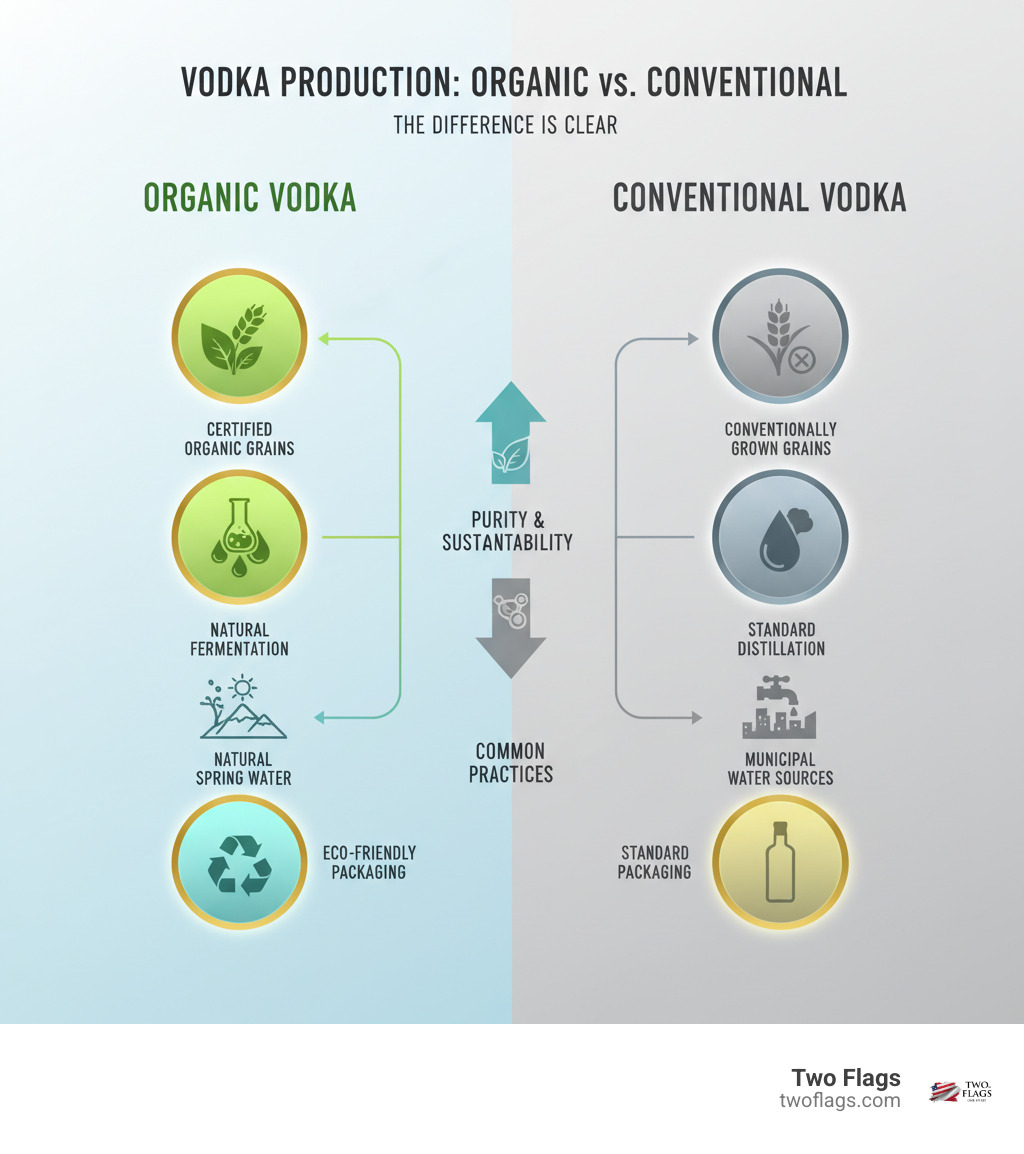
What Defines Organic Vodka and How Is It Made?
Understanding what makes vodka "organic" is essential when searching for what is the best organic vodka. At its heart, organic vodka represents a commitment to purity and environmental responsibility, starting with its ingredients.
The foundation of organic vodka lies in certified organic ingredients—grains like rye, wheat, or corn, or sometimes potatoes, grown without synthetic pesticides, herbicides, or GMOs. Organic farming practices prioritize soil health and biodiversity, creating a healthier ecosystem that produces higher-quality raw materials. The difference in the soil carries through to the final spirit.
The production journey begins in fields where farmers use crop rotation and natural fertilizers. Once harvested, these pristine ingredients move to the distillery for a carefully managed process.
The production process follows several key stages:
- Milling and Mashing: Organic grains or potatoes are milled and mixed with pure water, and heat converts starches into fermentable sugars.
- Fermentation: Yeast converts these sugars into alcohol. Unlike conventional methods, this process uses no nitrates or chemical blending agents.
- Distillation: The fermented liquid undergoes multiple distillations to purify the alcohol, removing impurities naturally without artificial additives. This meticulous step is key to achieving exceptional smoothness.
- Filtration: The spirit is refined further, often through charcoal, to improve taste and clarity.
Throughout every step, certification standards from organizations like the USDA Certified Organic program ensure the vodka meets strict criteria for purity and sustainability. The result is a vodka free from synthetic chemicals and GMOs, with a superior taste profile. To learn more, explore our guide on Sip Sustainably: Your Guide to Organic Vodka.
The Key Differences: Organic vs. Regular Vodka
While they may look identical, organic and conventional vodkas are very different. The most significant distinction is ingredient sourcing. Organic vodka requires certified organic crops, while regular vodka may use crops with pesticide residues.
The absence of chemicals extends through production. Organic vodka production forbids chemical blending agents or artificial additives, which are sometimes used in conventional vodkas. This creates a noticeable difference in the taste profile. Organic vodka often delivers a cleaner, crisper taste, allowing the natural character of the base ingredients to shine through.
Another key distinction is the environmental footprint. Organic farming promotes soil health and reduces water pollution. Finally, there is a price premium for organic vodka, reflecting the more labor-intensive farming and stricter production standards. For those seeking purity and environmental responsibility, the difference is worth it.
Here's how organic and regular vodka compare:
| Feature | Organic Vodka | Regular Vodka |
|---|---|---|
| Farming | Organic, no synthetic pesticides, herbicides, or GMOs | Conventional, may use synthetic pesticides, herbicides |
| Ingredients | Certified organic grains/potatoes, pure water | Conventionally grown grains/potatoes, various water sources |
| Additives | No artificial additives, chemical blending agents, or nitrates | May contain artificial additives or chemical agents |
| Production Standards | Rigorous, focus on purity and natural processes | Standardized, may prioritize efficiency over organic purity |
| Environmental Impact | Lower, promotes soil health, biodiversity, sustainability | Higher, potential chemical runoff, less sustainable |
| Taste Profile | Often cleaner, more pronounced natural flavors, smoother | Varies widely, can be neutral or have chemical notes |
| Price | Generally higher (premium) | Generally lower |
At Two Flags, we believe choosing organic vodka means choosing quality you can feel good about. To explore why these choices matter, visit The Organic Advantage: Why Your Choices Make a Difference.
What is the Best Organic Vodka? A Guide to Quality Indicators
Determining what is the best organic vodka is a personal journey, but objective quality markers can guide you to exceptional spirits. We evaluate organic vodkas based on their base ingredients, water source, distillation process, filtration methods, and sustainability practices. These elements combine to create a vodka's unique character.
Understanding these indicators helps you find your perfect match, whether you crave a bold, spicy character, silky smoothness, or want to support distilleries that prioritize sustainability.
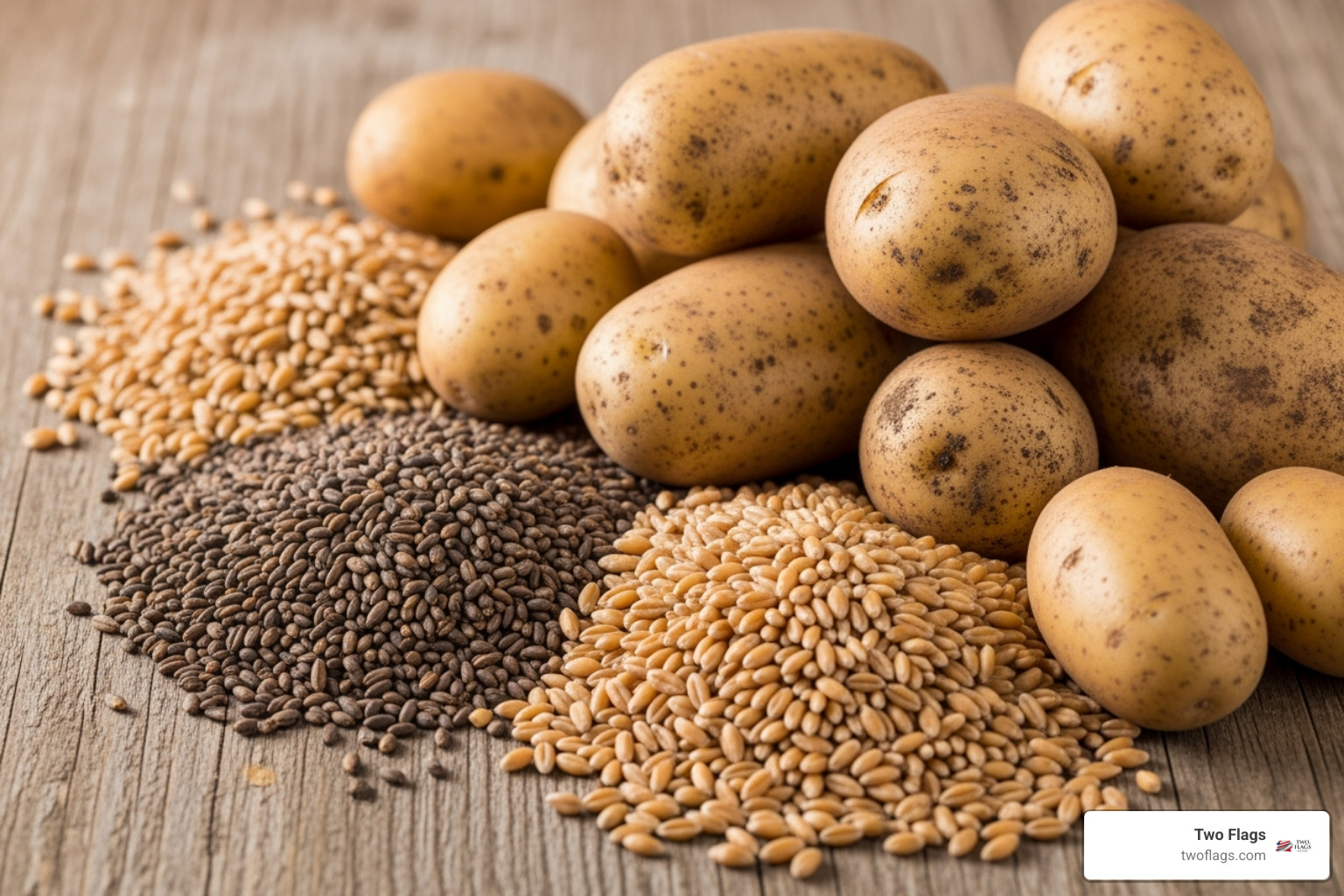
What is the best organic vodka ingredient for my palate?
A vodka's base ingredient is its soul, defining its flavor and mouthfeel. Each organic base brings a distinct profile to your glass.
- Rye: A bold choice with spicy, peppery notes and a creamy texture. Popular in Polish tradition, it delivers a robust personality.
- Wheat: Offers a smoother, cleaner experience with a subtle sweetness and hints of vanilla. It's incredibly versatile for those who prefer a more neutral, crisp vodka.
- Corn: Provides a naturally crisp, light character with mild sweetness and a bright, silky texture, making it easy to drink.
- Potato: Celebrated for its creamy, full-bodied mouthfeel. It offers an earthy, velvety experience with subtle notes of green apple or vanilla.
Innovative bases like organic sugarcane or ancient grains like spelt are also emerging, showcasing the creativity within the organic vodka landscape. At Two Flags, we carefully select our organic ingredients to create a vodka that balances smoothness with character.
How does distillation affect what is the best organic vodka?
The distillation process is crucial in shaping a vodka's final taste, purity, and smoothness.
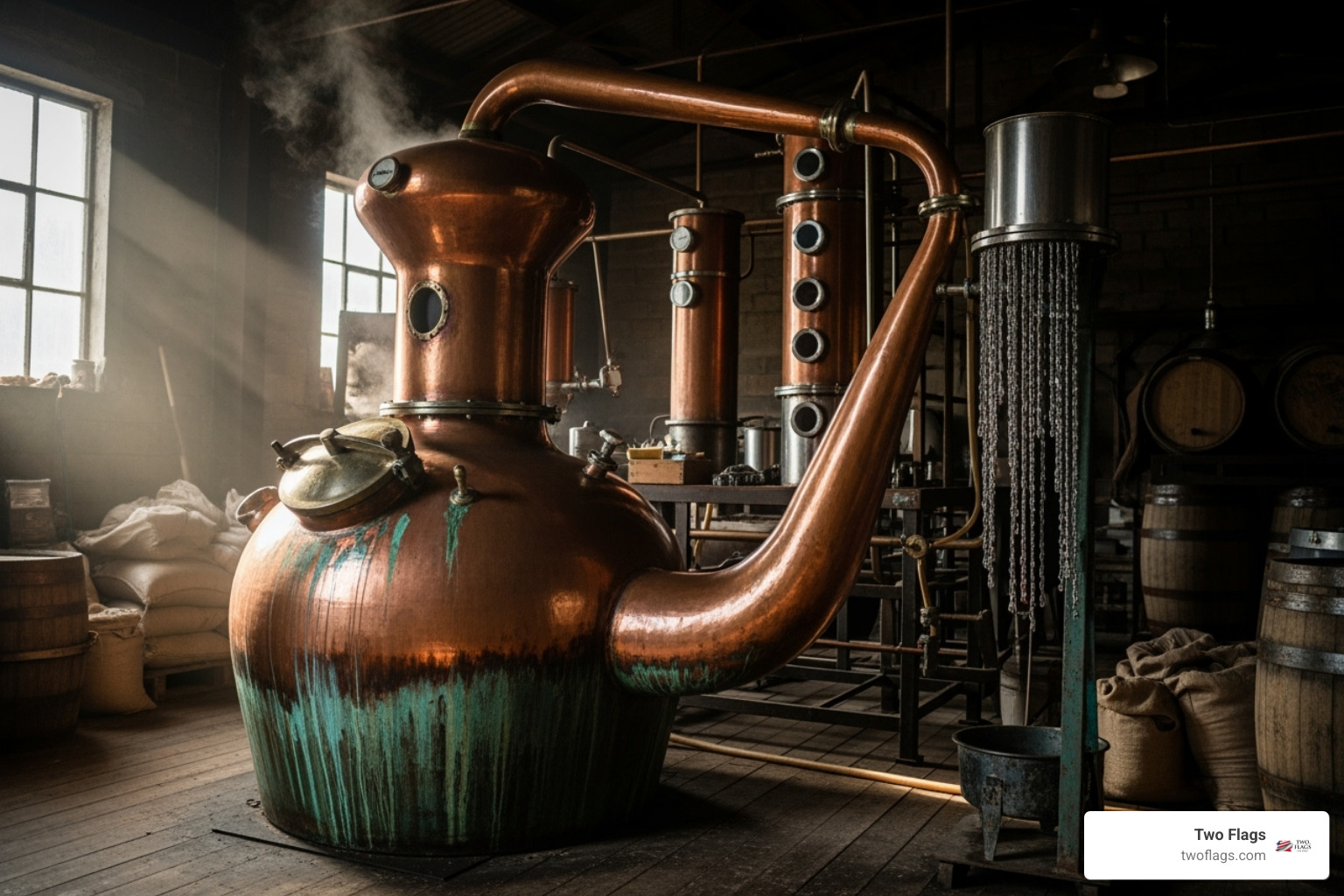
While a higher number of distillations generally increases purity, there's a delicate balance between purity and character. Too many distillations can strip away the spirit's personality. The art is in retaining desirable flavors from the organic base.
The type of still also matters. Traditional copper pot stills are favored by artisanal producers because copper naturally removes impurities, contributing to a smoother taste. Column stills are more efficient and can also produce exceptional vodka with proper expertise.
After distillation, charcoal filtration provides the final polish, removing any remaining impurities to create remarkable smoothness and clarity. The interplay of these methods is what defines the best organic vodka for your preference.
At Two Flags Vodka, our meticulous distillation process combines Polish expertise with modern precision for an ultra-premium finish. For a deeper dive, explore Beyond the Basics: A Guide to Premium Vodka Brands.
How to Use Organic Vodka in Cocktails
The clean, pure profile of organic vodka creates an exceptional foundation for cocktails, allowing other ingredients like fresh herbs and bright citrus to express themselves fully. Crafted without synthetic chemicals, it provides a "clean slate" that improves, rather than masks, the natural flavors you're mixing.

When considering what is the best organic vodka for cocktails, start with the classics where quality shines.
- A Martini is the ultimate test of vodka quality. With just a touch of dry vermouth, the smoothness and character of an exceptional organic vodka are on full display. At Two Flags, we craft our vodka with this purity in mind.
- The Moscow Mule also excels with organic vodka. The crisp spirit is the perfect counterpoint to spicy ginger beer and fresh lime, allowing their flavors to come through without chemical interference.
- In a Cosmopolitan, the clean taste of organic vodka allows the cranberry, lime, and orange liqueur to create a perfectly balanced drink.
Beyond the classics, try pairing organic vodka with fresh ingredients. Muddle fresh basil with organic vodka and lemon for a light refresher, or infuse it with cucumber for a crisp, garden-fresh cocktail. The beauty of organic vodka is its ability to lift simple combinations, making a vodka soda more refined and a Bloody Mary cleaner and brighter. Choosing organic vodka ensures a higher quality experience, representing a more conscious choice in every glass.
For more inspiration, explore our guide: Vodka Unveiled: Your Guide to Serving and Sipping.
Frequently Asked Questions about Organic Vodka
Let's clear up some common questions about organic vodka.
Does organic vodka taste different from regular vodka?
Yes, many people notice a difference. Organic vodka offers a purity of flavor from ingredients grown without synthetic chemicals. This allows the pronounced ingredient character—the spice of rye, sweetness of wheat, or creaminess of potato—to shine through. Free from the chemical additives sometimes found in conventional vodkas, organic vodka typically delivers exceptional smoothness and a cleaner, crisper finish. At Two Flags, we build our reputation on this purity.
Is organic vodka healthier?
While no alcoholic beverage is a health food, and we always encourage responsible consumption, many people choose organic vodka to avoid synthetic chemicals. By selecting an organic vodka, you're choosing a spirit made from ingredients grown without synthetic pesticides, herbicides, or GMOs. It's a cleaner product with no additives or chemical shortcuts. It's a more conscious choice for those concerned about what goes into their body, but moderation is always key.
Are all organic vodkas gluten-free?
Generally, yes. The distillation process is extremely effective at removing gluten proteins, even from wheat or rye-based vodkas, making them safe for most people with gluten sensitivities. For absolute certainty, vodkas made from naturally gluten-free sources like corn and potato are excellent choices. If you have serious concerns, look for vodkas that are explicitly certified and labeled "gluten-free." At Two Flags, we're proud to offer an organic, gluten-free vodka crafted to the highest standards.
Conclusion: Making Your Conscious Choice
Choosing an organic vodka is about more than just a spirit; it's a choice that reflects your values. From the organic fields to the careful distillation, it represents a commitment to purity and sustainability.
When asking what is the best organic vodka, remember to consider the base ingredients that shape its personality, the distillation methods that ensure smoothness, and the sustainability practices that define its integrity. Choosing organic means saying yes to transparency, craftsmanship, and quality. You're enjoying a spirit free from synthetic pesticides and artificial additives, whether neat, on the rocks, or in a cocktail.
At Two Flags Vodka, these values are at the heart of everything we do. Our ultra-premium, organic, gluten-free vodka is authentically crafted in Poland, honoring tradition while embracing sustainability. Recognized as "Exceptional" by the Beverage Testing Institute, we offer this luxury quality at a value that makes conscious choices accessible. We've poured our family's Polish-American heritage into every bottle, bridging tradition with innovation.
If you're in Chicagoland—from Arlington Heights to Barrington, Chicago to Crystal Lake, Des Plaines to Elk Grove Village, Glenview to Hawthorn Woods, or any of our other locations including Kildeer, Lake Zurich, Long Grove, Buffalo Grove, Northbrook, Palatine, Mount Prospect, Schaumburg, Wood Dale, Melrose Park, Franklin Park, Park Ridge, Elmhurst, Wilmette, Skokie, Morton Grove, Evanston, Winnetka, Glencoe, Northfield, Prospect Heights, South Barrington, Deerfield, Riverwoods, Niles, Addison, Itasca, Bensenville, Roselle, Glendale Heights, Bloomingdale, Streamwood, Rolling Meadows, and Schiller Park—we invite you to experience Two Flags Vodka for yourself.
Your journey to finding the best organic vodka is personal. We're here to be part of it. For more insights, explore Your Ultimate Guide to Picking the Perfect Vodka and From Farm to Glass: The Best Organic and Natural Vodkas.
Make your conscious choice. Sip sustainably. Enjoy exceptionally.




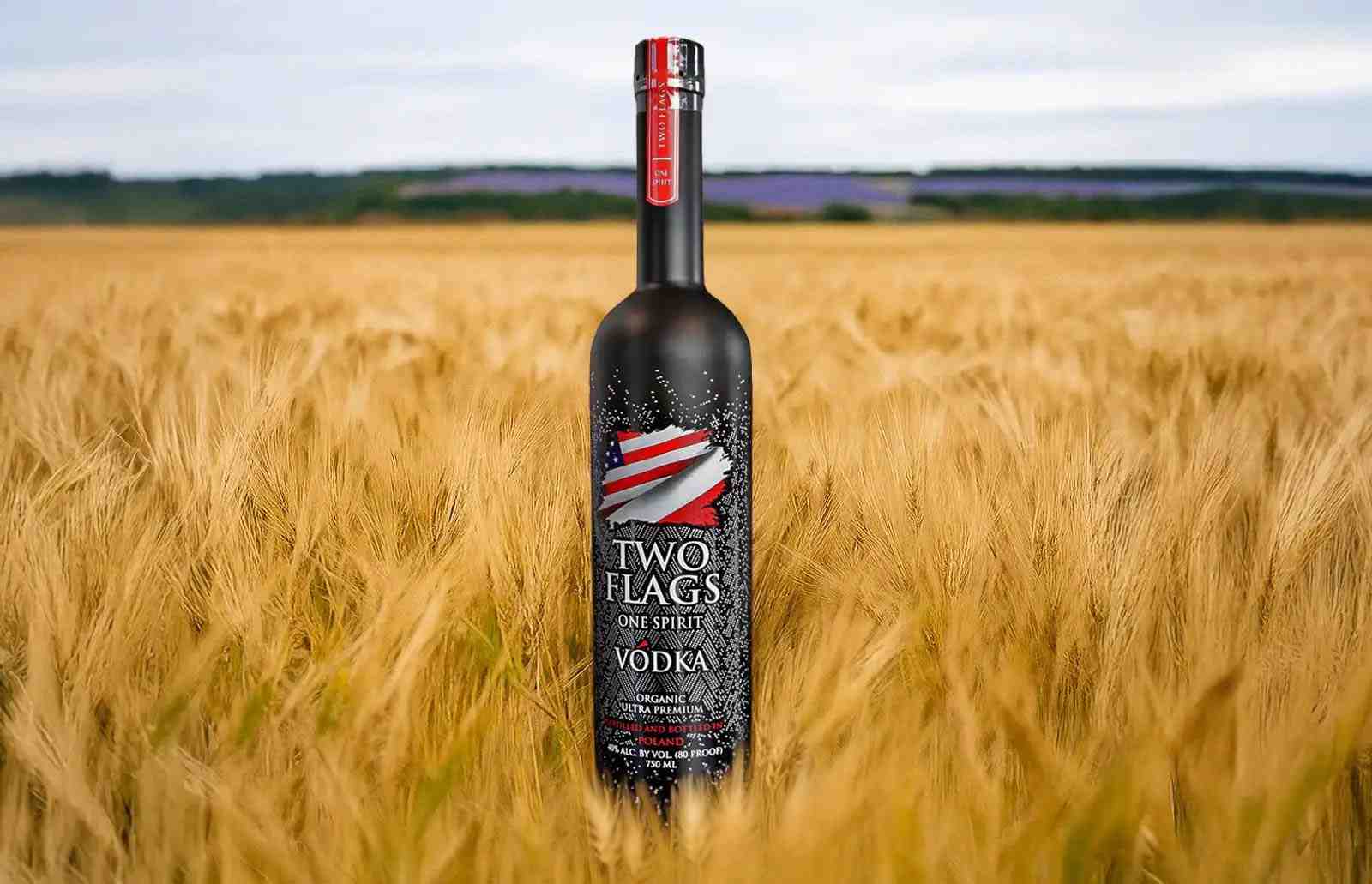

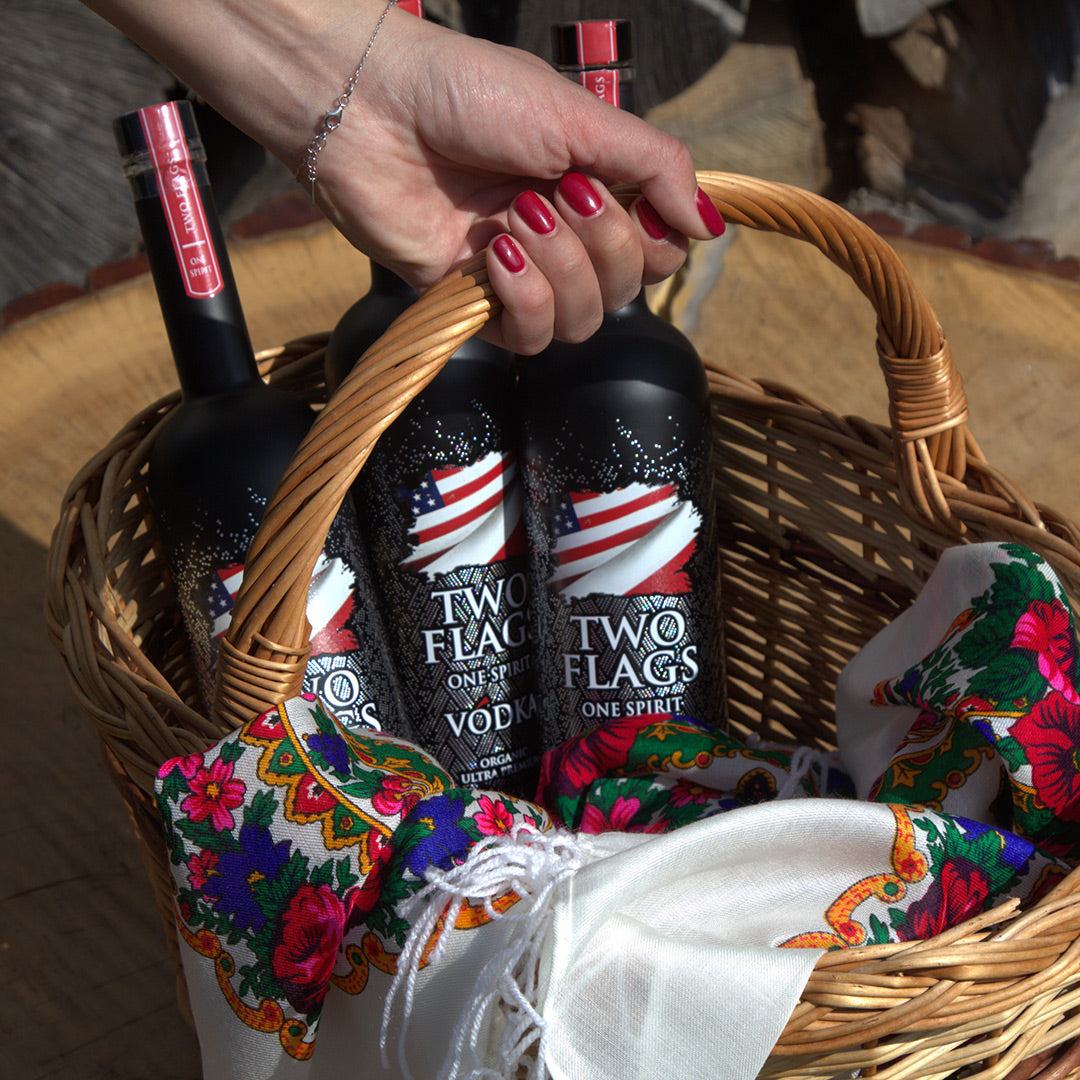
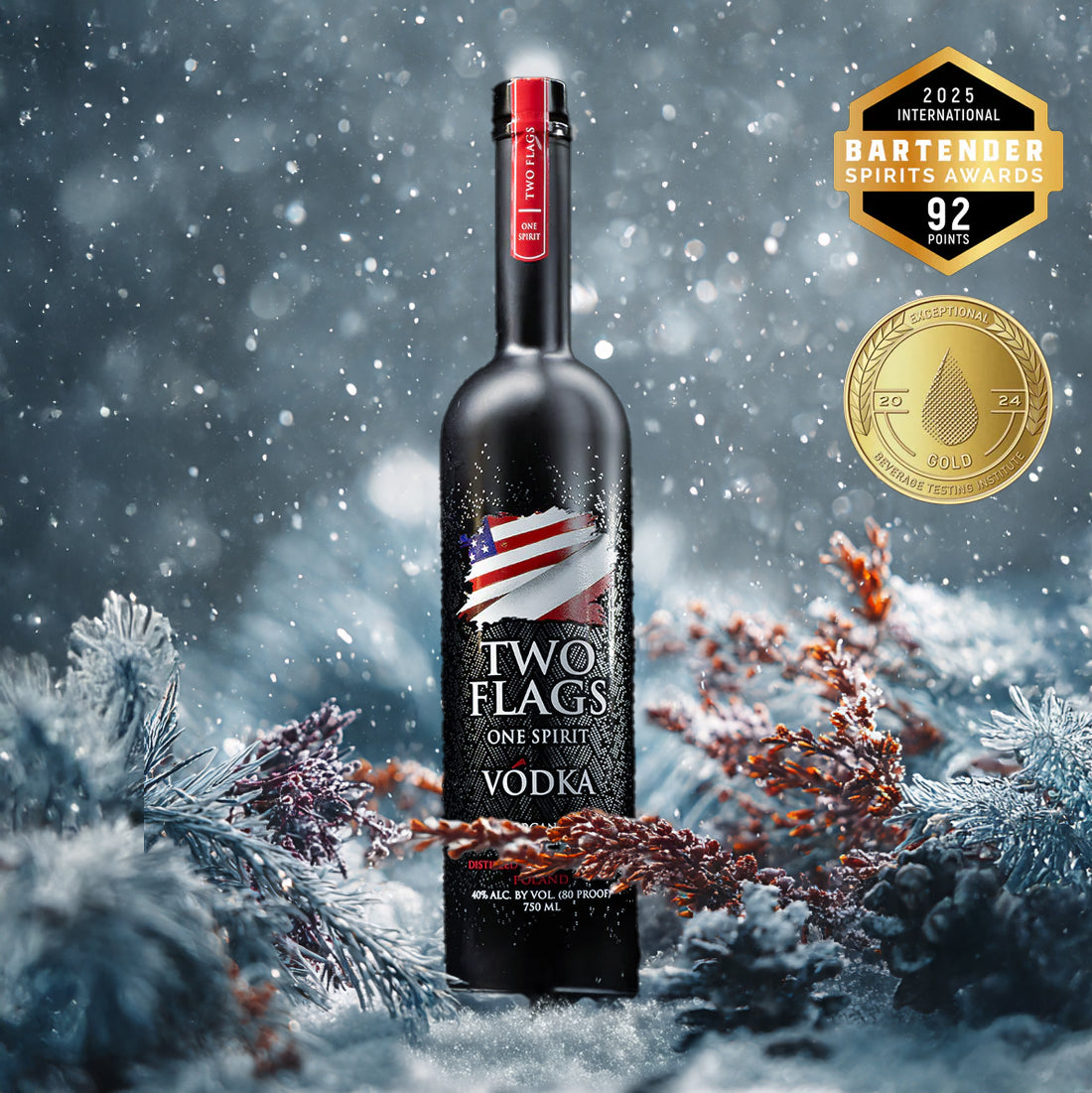

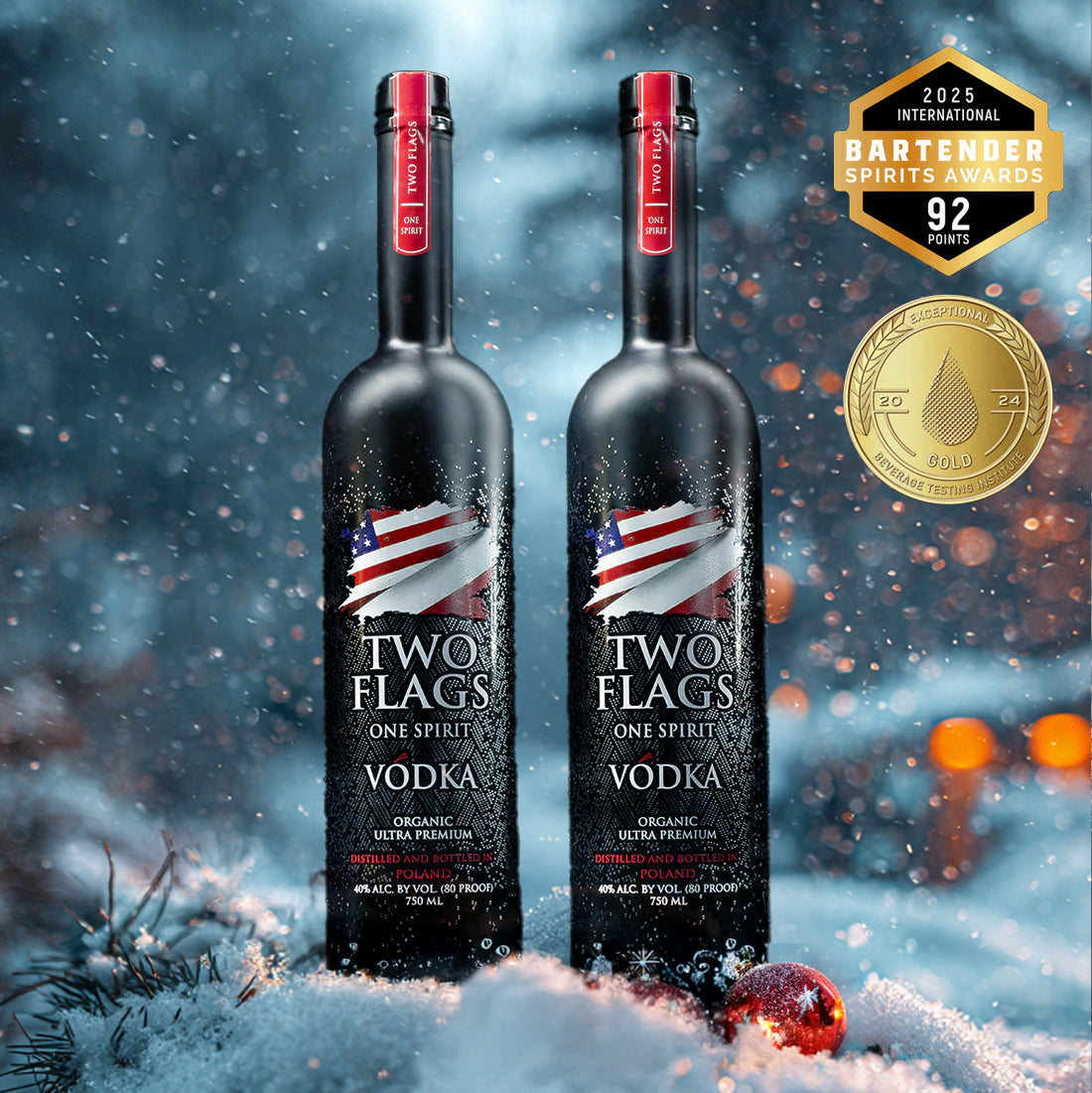

Zostaw komentarz
Ta strona jest chroniona przez hCaptcha i obowiązują na niej Polityka prywatności i Warunki korzystania z usługi serwisu hCaptcha.